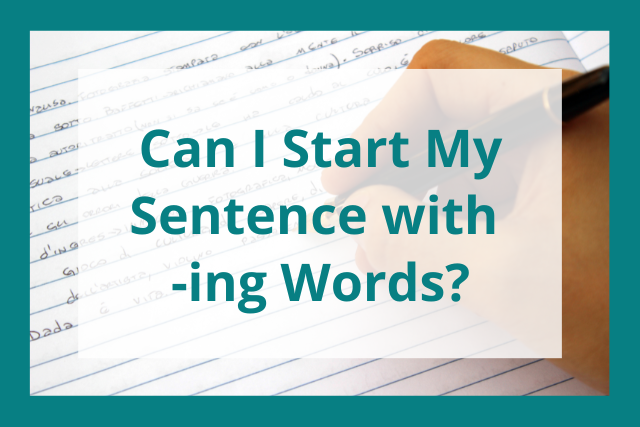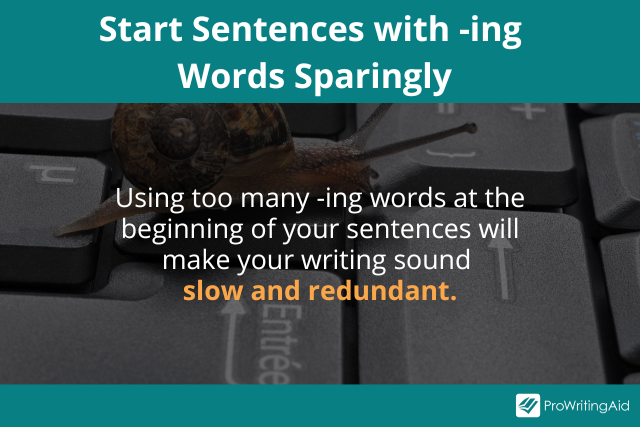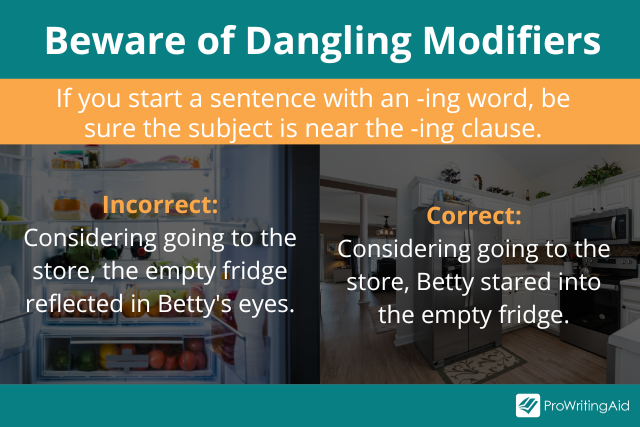
Starting a sentence with an -ing word is grammatically correct. But inexperienced writers may start too many sentences with -ing words, which makes their writing repetitive and dull. Additionally, using introductory -ing words can result in confusing sentence structures.
For clarity, it’s often better to avoid using -ing words to start a sentence. Other times, it’s necessary to use an -ing word. But how do you know when it’s appropriate to use an -ing word?
Let’s take a closer look at how to effectively use -ing words to start a sentence.
Can I Use -ing Words to Start a Sentence?
There’s no grammar rule saying you can’t start a sentence with an -ing word. But when you overuse them, the cadence of your writing will be verbose and slow.

Look at this example of a paragraph that uses multiple -ing words to start sentences:
- Taking the hint, I said goodbye. Opening the door, she wished me a nice day. Looking up at the sky, I thought of asking for an umbrella but decided it was best to leave quickly.
The paragraph reads slowly and becomes repetitive by the last sentence. It also feels passive, even though it is in the active voice.
It can be easy to fall into the habit of repeating sentence starts, but this will starve your writing of variety. A good target is to only start around 2% of your sentences with -ing words to create a good writing flow.
ProWritingAid can help you avoid starting too many sentences in a row in the same way. Try out our free grammar checker to improve the flow of your writing.
In addition to redundant sentence starts, you also need to be careful that your meaning is clear.
Starting sentences with -ing words can lead to dangling modifiers, which cause confusion for readers. In our first example (Taking the hint, I said goodbye.), the modifier “taking the hint” is near the subject “I,” so the meaning is clear. But writers who start sentences with -ing words sometimes misplace the modifier, which makes it confusing.
- Considering going to the store, the empty fridge reflected in Betty’s eyes.
In this sentence, the modifier “considering going to the store” modifies the fridge. But fridges can’t consider going to the store! The modifier should modify Betty:
- Considering going to the store, Betty stared into the empty fridge.
Or better yet, rewrite the sentence:
- Betty stared into the empty fridge. It was time to go to the store.

When to Use -ing Word Sentence Starts
Sometimes, -ing words are also gerunds. A gerund is a word that comes from a verb but functions as a noun in a sentence. In these cases, starting with an -ing words is usually the right choice.
Here’s an example:
- Fishing is fun.
“Fishing” is a gerund—it’s functioning as the subject of the sentence. In this example, it wouldn’t make sense to rewrite the sentence to start without the -ing word, since the -ing word is the subject. In cases like these, using an -ing word at the start of your sentence is totally fine.
When an -ing word functions as a verb, however, it’s not a gerund. Be careful when you use -ing verbs at the beginning of a sentence because it can easily cause confusion.
- Traveling north, the weather got colder and colder.
This sentence doesn’t make sense as it fails to include a subject. It sounds like the weather is traveling north in this sentence. Adding a subject rectifies this:
- As I was traveling north, the weather got colder and colder.
It is also important to only use an -ing phrase when the action occurring in that phrase happens at the same time as the action in the main part of the sentence. Otherwise, you’re left with something that doesn’t work:
- Unlocking the door, she left the room.
In this case, it doesn’t make sense for her to unlock the door and leave the room at exactly the same time. To rectify this, you need to pair two actions which can happen together and make her movement sequential:
- Unlocking the door, she sighed, then left the room.
Conclusion on -ing Words to Start a Sentence
Using -ing words to start a sentence isn’t incorrect. Just follow these guidelines to ensure your meaning is clear.

